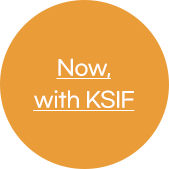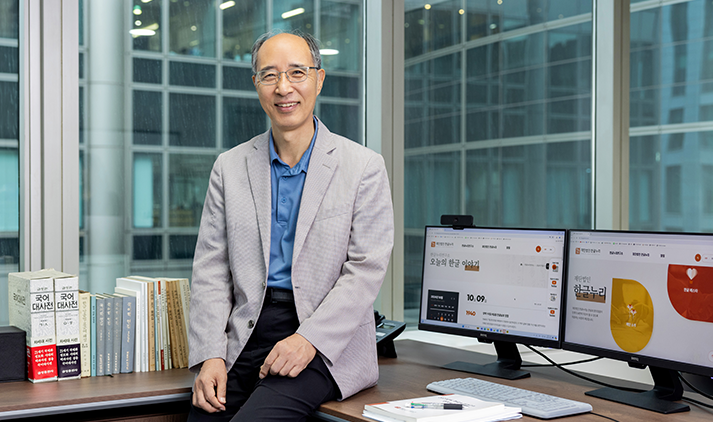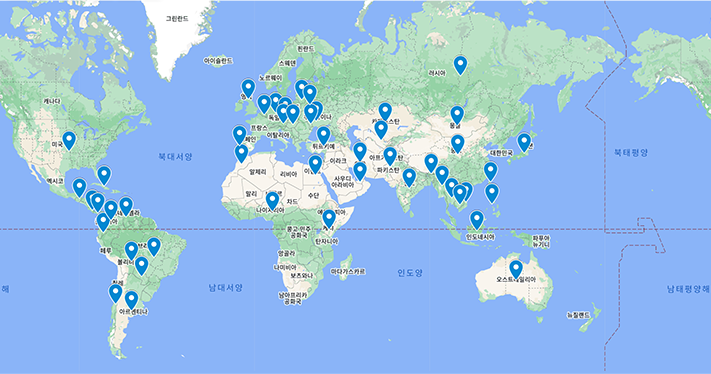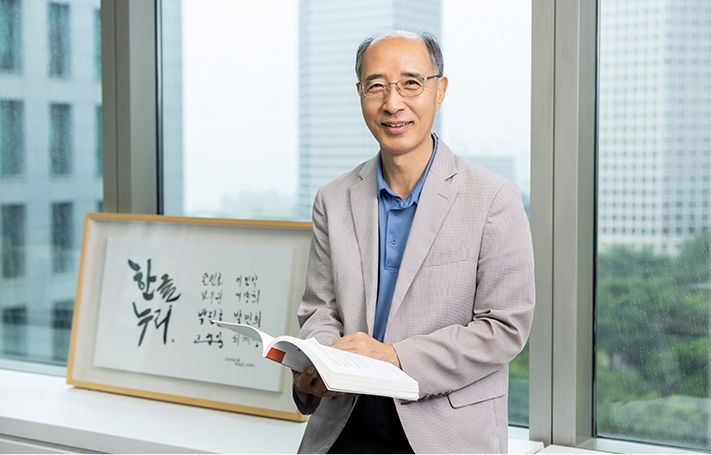

Director Kim Ju-won of the Hangeul
Nuri Institute, which promotes the excellence
of Hangeul globally and researches
its potential for expansion
The Hangeul Nuri Institute, an affiliate of the Hangeul Nuri Foundation, is researching a Hangeul-based writing
system for various world languages. We met with Director Kim Ju-won, who is both the president of the Hangeul
Society and the director of the Hangeul Nuri Institute, to learn more about his efforts to develop a
Hangeul-based foreign language notation and his work on a foreign language notation guideline proposal.
Hello, Director Kim Ju-won. Could you please introduce the Hangeul Nuri Foundation(hereafter referred to as
Hangeul Nuri) and the Hangeul Nuri Institute?
Hello. The Hangeul Nuri Foundation is a foundation established to research and promote a Hangeul-based writing
system for various world languages. Currently, Hangeul is primarily used for Korean notation, and we aim to
expand its usage. Hangeul Nuri oversees the Hangeul Nuri Institute, a specialized research center for Hangeul
and scriptology. Since February 7, 2022, the Hangeul Nuri Institute has been operated by myself and two PhD
researchers, forming a three-member team.
Many Koreans expect that Hangeul, with its well-known scientific structure, could be used to write other
languages with a few additional characters or notation rules. In fact, based on this belief, there have been
continuous efforts to propose Hangeul-based foreign language notations through independent research. However, in
academia, scriptology is considered a peripheral subfield within linguistics, and thus, ‘Hangeul-based foreign
language notation’ has not attracted much interest from specialized researchers.
In this academic environment, the Hangeul Nuri Institute seeks to conduct rigorous, scholarly research to
determine whether Hangeul can indeed be as widely used as the Latin or Cyrillic alphabets, identify any
practical issues in its application, and explore possible solutions to overcome them. The institute's main
activities include: ▲ Research on the history of Hunminjeongeum and Hangeul ▲ Collection and organization of
existing research on Hangeul-based foreign language notation ▲ Organizing events for foreigners to write their
language using Hangeul (Hangeul Festa) ▲ Conducting independent and collaborative research on Hangeul-based
foreign language notation.
 Director Kim Ju-won explains the activities of the Hangeul Nuri Institute
Director Kim Ju-won explains the activities of the Hangeul Nuri Institute
Director, you also serve as the president of the Hangeul Society, which has a 116-year history, and you are an
emeritus professor in the Department of Linguistics at Seoul National University, actively conducting various
research projects. As a linguist, which particular areas of the Korean language interest you the most?
As a historical linguist, I have always been deeply interested in the history of the Korean language. To
understand the history of Korean, it is necessary to study the Altaic languages, which are believed to be
genealogically related. My doctoral dissertation was on vowel harmony in the Manchu-Tungusic languages, and,
surprisingly, this research helped me find a clue to understanding the term “seolchuk (舌縮)” in the
Hunminjeongeum Haerye (a commentary on the creation of Hangeul), which remains an unresolved term. This led to
further research on the Hunminjeongeum Haerye and subsequently to research on Hangeul itself. The results of
this research were included in the general-interest book Hunminjeongeum (2013). Since then, I have been
comparing Hunminjeongeum with other East Asian writing systems, highlighting the superiority of Hunminjeongeum.
In addition, I have been actively giving public lectures to share my research with a broader audience.
The Hangeul Nuri Institute launched the Hangeul Festa in 2023 as its first international initiative to share
Hangeul with the world. Could you explain what Hangeul Festa is about and what significant achievements it has
brought?
Hangeul Festa is a video contest titled “Using Hangeul Together with the World.” Foreign participants are asked
to speak in their native language on a given contest topic, write it using Hangeul (Hunminjeongeum), and upload
the video on YouTube as their entry. The second edition of the contest, held this year, featured the following
topics: ▲ 1. Writing the phrase “Cute Child” or the lyrics of a lullaby in Hangeul ▲ 2. Writing about the origin
of humanity or the birth of a nation in Hangeul ▲ 3. Professional category: Writing your national anthem in
Hangeul. The contest began in April and closed on August 15. As a result, 240 entries were submitted from
participants in 48 countries, representing 41 languages. The top five languages by number of participants were:
Vietnamese (35 participants), Arabic (27 participants), Indonesian (26 participants), Spanish (24 participants),
and Japanese (19 participants). Languages with one or two participants included Urdu, Tagalog, Bengali, Kurdish,
Ryukyuan, Tamil, Greek, Javanese, Hungarian, Dzongkha (Bhutan), and Romanian.
 A map displaying the 48 countries represented by participants of Hangeul Festa
A map displaying the 48 countries represented by participants of Hangeul Festa
Many of the entries showed remarkable effort in accurately transcribing their native languages using
Hunminjeongeum. Through Hangeul Festa, the Hangeul Nuri Institute aims to raise awareness that Hangeul, as a
phonetic alphabet, can precisely represent not only Korean but also various other languages, thus showcasing its
versatility.
This initiative allows people with an interest in Korean language and culture to use a standardized writing
system for their language in Hangeul, which also helps provide accurate phonetic transcription for languages
such as English, Chinese, and Japanese, facilitating early language education. Furthermore, Hangeul can help
preserve endangered languages by providing a writing system, contributing to linguistic diversity, and reduce
illiteracy by offering an easy-to-learn script for difficult writing systems. Ultimately, the goal is to
establish Hunminjeongeum (Hangeul) as a universal tool for accurately expressing ideas, embodying King Sejong’s
original vision of “an easy script for writing one’s thoughts.”
(From left) The official poster for the Using Hangeul Together with the World Video Contest, ‘Hangeul Festa
2024’, and the grand prize-winning entry from ‘Hangeul Festa 2023.’
In addition to Hangeul Festa, could you introduce any other major projects or research activities currently
being pursued by the Hangeul Nuri Institute?
To support our independent research on writing systems, the Hangeul Nuri Institute launched the Script Research
Group in April 2024, centered around graduate students from the Department of Linguistics at Seoul National
University. This group is dedicated to examining the feasibility and challenges of transcribing various
languages using Hangeul. The reason for forming a research group that includes external members is that the
small number of researchers at the institute alone cannot cover the vast number of languages requiring
phonological analysis and verification for Hangeul transcription. Additionally, having more researchers with a
strong background in phonology allows for a more creative and diverse approach to evaluating the transcription
system, which is why the group was formed.
Currently, the Script Research Group consists of four graduate students and one undergraduate student, excluding
researchers from the Hangeul Nuri Institute. They hold regular online meetings approximately once every two
weeks. During these sessions, members present draft writing systems for the languages they are assigned, and the
group engages in discussions to refine these proposals. On average, transcription systems for 4-5 languages are
proposed and reviewed every two weeks.
Recently, Hangeul Nuri selected two learners from KSI, majoring in Korean Language and Culture or Korean
Literature at Korean universities or graduate schools, as Hangeul Nuri Scholars. Could you share the reasons
behind your decision to offer scholarships to KSI learners and your expectations for how these students will
grow in the future?
I’m a bit embarrassed because we aren’t able to offer much support at this time. We initiated the scholarship
after hearing that some students who came to Korea to study Korean Language and Literature were facing financial
difficulties. Since there were many applicants, we selected students who were proficient in Korean. I hope they
will grow into individuals who can help others in the field of Korean Language and Literature.
With the spread of the Korean Wave (Hallyu), interest in learning Korean among foreigners has been increasing
rapidly. However, there are concerns that the overuse of slang and abbreviations by young Koreans is damaging
the beauty of Hangeul. In particular, some foreigners learn these new terms first (e.g., dog = daengdaengi).
What are your thoughts on this phenomenon?
First of all, since Korean and Hangeul are two different things, I don’t think the frequent use of certain types
of words necessarily harms the beauty of Hangeul. For foreigners to learn Korean, the best way is to be
frequently exposed to environments where Korean is spoken. In that process, they will naturally learn
abbreviations, slang, and even informal expressions. When they learn such words, they also learn the contexts in
which they are used, so I don’t think there’s much risk of them learning Korean incorrectly. However, we should
avoid using such terms excessively. As for words like “daengdaengi,” this originates from the characteristics of
Hangeul letters. There aren’t many examples like this, but it can show that Hangeul has playful aspects as well.

Finally, as the Hangeul Nuri Institute marks its second anniversary, could you share its ultimate vision and
goals? What are your future plans or the direction you intend to take?
King Sejong created an easy-to-learn writing system for those who could not express what they wanted to say in
written form. Jeong In-ji, a scholar from the early Joseon Dynasty, said that all sounds could be written using
the characters of Hunminjeongeum. While it’s difficult to take this statement literally, since Hangeul is a
phonetic alphabet composed of consonants and vowels, it does suggest the potential for Hangeul to transcribe the
sounds of other languages.
With the global spread of Hallyu, people around the world are eager to learn Korean and Hangeul. Hangeul has
attracted worldwide attention not only for its ease of learning but also for its distinctive and beautiful
letter shapes. The Hangeul Nuri Institute prefers the term “Hangeul-based foreign language notation” over the
somewhat nationalistic and culturally aggressive term “globalization of Hangeul.”
Moving forward, the Hangeul Nuri Institute plans to deepen its understanding and research of Hangeul’s
characteristics as a script to develop “Recommended Foreign Language Notation Guidelines” for various languages
around the world. This system will help people learn foreign languages more accurately. Additionally, Hangeul
(Hunminjeongeum) will be used to write endangered minority languages, unwritten languages, and languages with
difficult scripts, so that Hangeul can become a script enjoyed by people globally. Through this, we will strive
to realize King Sejong’s original vision.